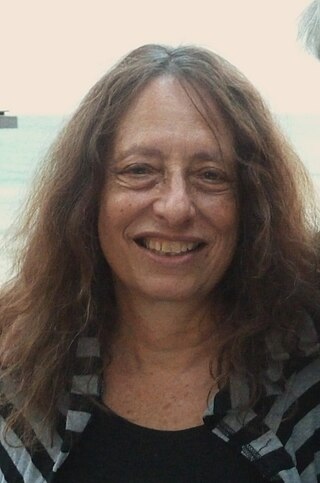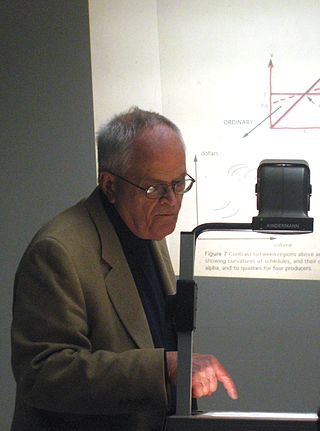Related Research Articles

Carol Gilligan is an American feminist, ethicist, and psychologist, best known for her work on ethical community and ethical relationships.

Richard Julius Herrnstein was an American psychologist at Harvard University. He was an active researcher in animal learning in the Skinnerian tradition. Herrnstein was the Edgar Pierce Professor of Psychology until his death, and previously chaired the Harvard Department of Psychology for five years. With political scientist Charles Murray, he co-wrote The Bell Curve, a controversial 1994 book on human intelligence. He was one of the founders of the Society for Quantitative Analysis of Behavior.

Qualitative research is a type of research that aims to gather and analyse non-numerical (descriptive) data in order to gain an understanding of individuals' social reality, including understanding their attitudes, beliefs, and motivation. This type of research typically involves in-depth interviews, focus groups, or observations in order to collect data that is rich in detail and context. Qualitative research is often used to explore complex phenomena or to gain insight into people's experiences and perspectives on a particular topic. It is particularly useful when researchers want to understand the meaning that people attach to their experiences or when they want to uncover the underlying reasons for people's behavior. Qualitative methods include ethnography, grounded theory, discourse analysis, and interpretative phenomenological analysis. Qualitative research methods have been used in sociology, anthropology, political science, psychology, communication studies, social work, folklore, educational research, information science and software engineering research.

George William "Bill" Domhoff is a Distinguished Professor Emeritus and research professor of psychology and sociology at the University of California, Santa Cruz, and a founding faculty member of UCSC's Cowell College. He is best known as the author of several best-selling sociology books, including Who Rules America? and its seven subsequent editions.
Quantitative psychology is a field of scientific study that focuses on the mathematical modeling, research design and methodology, and statistical analysis of psychological processes. It includes tests and other devices for measuring cognitive abilities. Quantitative psychologists develop and analyze a wide variety of research methods, including those of psychometrics, a field concerned with the theory and technique of psychological measurement.
Robert Aubrey Hinde was a British zoologist, ethologist and psychologist. He served as the Emeritus Royal Society Research Professor of Zoology at the University of Cambridge. Hinde is best known for his ethological contributions to the fields of animal behaviour and developmental psychology.

Harrison Colyar White is the emeritus Giddings Professor of Sociology at Columbia University. White played an influential role in the “Harvard Revolution” in social networks and the New York School of relational sociology. He is credited with the development of a number of mathematical models of social structure including vacancy chains and blockmodels. He has been a leader of a revolution in sociology that is still in process, using models of social structure that are based on patterns of relations instead of the attributes and attitudes of individuals.
Steven C. Hayes is an American clinical psychologist and Nevada Foundation Professor at the University of Nevada, Reno Department of Psychology, where he is a faculty member in their Ph.D. program in behavior analysis. He is known for developing relational frame theory, an account of human higher cognition. He is the co-developer of acceptance and commitment therapy (ACT), a popular evidence-based form of psychotherapy that uses mindfulness, acceptance, and values-based methods, and is the co-developer of process-based therapy (PBT), a new approach to evidence-based therapies more generally. He also coined the term clinical behavior analysis.

Dame Uta Frith is a German-British developmental psychologist at the Institute of Cognitive Neuroscience at University College London. She has pioneered much of the current research into autism and dyslexia. She has written several books on these subjects, arguing for autism to be seen as a mental condition rather than as one caused by parenting. Her Autism: Explaining the Enigma introduces the cognitive neuroscience of autism. She is credited with creating the Sally–Anne test along with fellow scientists Alan Leslie and Simon Baron-Cohen. She also pioneered the work on child dyslexia. Among students she has mentored are Tony Attwood, Maggie Snowling, Simon Baron-Cohen and Francesca Happé.

Anthony Francis Clarke Wallace was a Canadian-American anthropologist who specialized in Native American cultures, especially the Iroquois. His research expressed an interest in the intersection of cultural anthropology and psychology. He was famous for the theory of revitalization movements.
Raymond Arnold Winbush a.k.a. Tikari Bioko is an American scholar and activist known for his systems-thinking approaches to understanding the impact of racism/white supremacy on the global African community. He is currently Research Professor and Director of the Institute for Urban Research at Morgan State University in Baltimore, Maryland.
Dermot Barnes-Holmes is a Professor of the School of Psychology at Ulster University and was Foundation Professor at the Department of Psychology at National University of Ireland, Maynooth. He is known for an analysis of human language and cognition through the development of Relational Frame Theory with Steven C. Hayes, and its application in various psychological settings. He was the world's most prolific author in the experimental analysis of human behaviour between the years 1980 and 1999. He was awarded the Don Hake Basic/Applied Research Award at the 2012 American Psychological Association Conference in Orlando, Florida. He is a past president and fellow of the Association for Contextual Behavioral Science, is a recipient of the Quad-L Lecture Award from the University of New Mexico and most recently became an Odysseus laureate of the Flemish Science Foundation and a fellow of the Association for Behavior Analysis International. In 2015 he accepted a life-time senior professorship at Ghent University in Belgium. He originally conceptualized and programmed the Implicit Relational Assessment Procedure (IRAP).
Kenneth J. Gergen is an American social psychologist and emeritus professor at Swarthmore College. He obtained his Bachelor of Arts from Yale University (1957) and his PhD from Duke University (1962).
Judith V. Jordan is the co-director and a founding scholar of the Jean Baker Miller Institute and co-director of the institute's Working Connections Project. She is an attending psychologist at McLean Hospital and assistant professor of psychology at the Harvard Medical School. She works as a psychotherapist, supervisor, teacher and consultant. Jordan's development of relational-cultural therapy has served as a foundation for other scholars who have used this theory to explore the workplace, education. leadership and entrepreneurship.
Joseph B. Walther is the Mark and Susan Bertelsen Presidential Chair in Technology and Society and the Director of the Center for Information Technology & Society at the University of California, Santa Barbara. His research focuses on social and interpersonal dynamics of computer-mediated communication, in groups, personal relationships, organizational and educational settings. He is noted for creating social information processing theory in 1992 and the hyperpersonal model in 1996.
Stanley Wasserman is an American statistician and prior to retirement was the Rudy Professor of Statistics, Psychology, and Sociology at Indiana University Bloomington and the Academic Supervisor of the International laboratory for Applied Network Research at Moscow's National Research University – Higher School of Economics. He is known for his work on social network analysis, mathematical sociology, network science and multidimensional network. In 2017 Wasserman launched the Master's program 'Applied statistics with Network Analysis' at National Research University – Higher School of Economics.
Siaufung "Bosco" Tjan was a Chinese-American psychologist and neuroscientist. He was a professor of psychology at the University of Southern California's Dornsife College of Letters, Arts & Sciences.
Robert Dale Slocum is an American biologist and botanist. He is a professor of biology in the Center for Natural Sciences at Goucher College. His research focuses on plant physiology, molecular biology, and biotechnology.
Rolf Eduard Helmut Muuss was a German-American psychologist and academic. His work in psychology focused primarily on adolescent psychology and development. Muuss' academic career was spent primarily at Goucher College, where he taught from 1959 to 1995. Muuss enlisted and fought in the Luftwaffe during WWII.
Mark de Vos is Professor of Linguistics at Rhodes University. His primary research interests are in the area of Minimalist Syntactic Theory, specifically in areas of pseudo-coordination and agreement as well as Linguistic approaches to the Psycholinguistics of early reading in indigenous languages of South Africa.
References
- 1 2 3 4 5 6 Englund, Molly (June 18, 2019). "The reinvention of Rick Pringle". Goucher Magazine. Retrieved July 22, 2019.
- ↑ Pringle, Leslie Richard (1972). The novels of Kurt Vonnegut, Jr.: a study of belief (Thesis). OCLC 28137517.
- ↑ Pringle, Leslie Richard (1977). Mental transformations of possible and impossible 4-cornered tori (Thesis). Kansas State University. hdl:2097/11651.
- ↑ Pringle, Leslie Richard (1979). "Perceived Number Equivalence By Adults And Children: A Normalization Model Of Size-density Coordination". ProQuest Dissertations & Theses Global. ProQuest 302912841.
- 1 2 "Goucher College 2018-2019 Undergraduate Course Catalog". Goucher College. Retrieved April 21, 2018.
- ↑ "Professor Emerita Jean Bradford, 1935 to 2016". In The Loop. Goucher College. January 13, 2017. Retrieved April 21, 2018.
- ↑ "Maryland Colleges Searching For Qualified Students" . The Star-Democrat. August 6, 1990. Retrieved April 21, 2018– via Newspapers.com.
- ↑ "Center for Psychology Faculty". Goucher College. Retrieved April 21, 2018.
- ↑ M., Lerner, Richard (2014). University-Community Collaborations for the Twenty-First Century : Outreach Scholarship for Youth and Families. Simon, Lou Anna K. Hoboken: Taylor and Francis. ISBN 978-1317731337. OCLC 870226829.
{{cite book}}: CS1 maint: multiple names: authors list (link) - ↑ Brustein, Rachel (October 23, 2015). "Professors report Campus Climate Survey data". The Quindecim. Retrieved April 21, 2018.